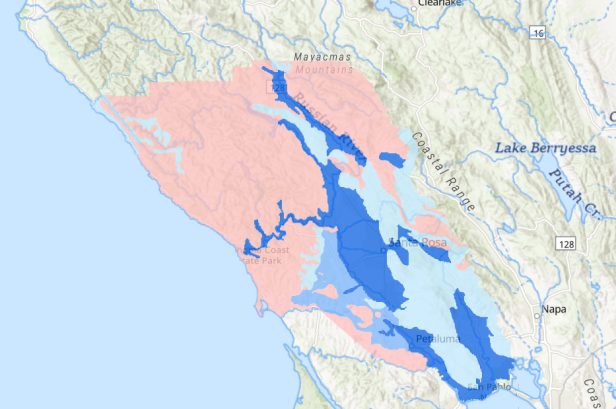 photo credit: Courtesy of Sonoma County
photo credit: Courtesy of Sonoma CountySonoma County’s well ordinance map shows where groundwater is most plentiful, in dark blue.
A Sonoma County Superior Court judge has ruled the county's recent well ordinance doesn't jibe with state environmental rules, and that the county has failed to take proper care of public resources.
The decision reopens wrangling over alleged over-pumping of groundwater. That dwindling resource is what prompted the creation of a well ordinance more than a year ago.
Plaintiffs in the case are heralding the Aug 21st ruling.
"We think it was a big victory for public trust resources both in the Russian River watershed and statewide," said Sean Bothwell, executive director of California Coastkeeper Alliance.
The public trust doctrine holds that governments can't degrade navigable waterways---basically any body of water where boating is possible.
"Essentially, they created an ordinance that wasn't based in fact and the evidence before them," Bothwell continued.
Bothwell and Don McEnhill, executive director of Russian Riverkeeper, said that will likely force the County to collect and analyze data before drafting new rules.
McEnhill maintained that regarding the county's earlier effort, the judge found, "...that they had not done any analysis to demonstrate that those were actually going to protect public trust resources like salmon and steelhead populations," McEnhill said.
McEnhill argued that the facts, the dispute and the legal outcome shouldn't come as a surprise.
"This is not something new, this is something that both NOAA Fisheries and Fish & Wildlife brought to the county's attention in 2014," McEnhill said.
The environmental groups argue the county's loose groundwater rules harm the river by draining tributaries, and that underground water is being pumped with enough abandon that river flows are impacted as river water seeps into the ground to replace the void in the aquifer.
"These wells are right next to these small creeks, the water in the stream is basically is the same waters they're pumping, they're just pumping below the stream. The goal of this ordinance is to make sure when someone flips on their pump, they don't pull the entire flow of the stream below the surface," McEnhill stated.
And without comprehensive data and study, that can't be assured.
California's 2014 Groundwater Sustainability Act---or SGMA required the adoption of management plans by 2022. Those plans are meant to ensure pumping does not exceed the amount of water going in to an aquifer. The state law gives agencies until 2042 to make the plans reality.
Bothwell however argued that the Russian River and its fish, don't have that kind of runway.
"SGMA is a long process and quite frankly we can't wait for the compliance deadlines, the river can't wait and salmon species can't wait for SGMA to come into full effect," Bothwell said.
McEnhill echoed Bothwell's sense of urgency.
"One, this has been a longstanding problem and two, in the more recent droughts, this is not just harming, but killing salmon and preventing them from completing their lifecycle," McEnhill said.
McEnhill maintained that the groups aren't seeking to elevate the environment over the needs of people or agriculture.
"Our goal is to see that not only are salmon protected, but in the last 30 years hundreds of residential homeowners have had their wells dry up, so one of our hopes is that what we do to protect the salmon will protect existing well owners, so we're not forcing people who own a home today to spend thousands of dollars to build a new well because someone handed out a permit to their neighbor and they are just pumping the area to death," McEnhill said.
McEnhill foresees some possible solutions...more conservation and recycled water on the horizon, along with efforts to coordinate well use to prevent too much from being drawn at the same time.
"Ultimately, this should lead to more thought going in to what we're planting where we're planting it and how we're managing it," McEnhill said.
That may mean growers and vintners switching to varietals more tolerant of dry farming, as is practiced in parts of Europe, he added.
Ultimately, he argued, the ruling should help the county prepare for drier years ahead.
"We do think this sets us up for a better future, considering the huge variability in our rainfall that we are going to see from climate change," McEnhill said.
KRCB News reached out to the county counsel's office, which represented Sonoma County in the suit for comment. We asked if there are grounds for appeal and what actions the county's legal staff would advise the Board of Supervisors to take.
We received a response from Matt Brown in the county's communications department reading, "We are aware of the ruling and, with the assistance of county counsel, are in the process of reviewing it. We have no other comment at this time."
McEnhill, citing county officials said they expect a study could take about two years.
McEnhill doesn't foresee the county seeking an appeal, or slow walking action.
"I get the sense from the county they're not looking to drag this out because that puts a lot of property owners in limbo. They and we would like to see certainty sooner rather than later."
McEnhill said the Aug. 21st judge's ruling demands a response.
"Doing nothing is definitely not an option, other than just shutting down well permitting and I don't think the county [sic] wants to do that," McEnhill concluded.

 Live Radio
Live Radio




